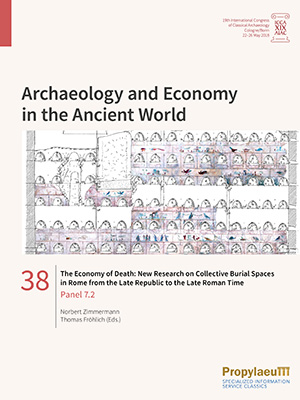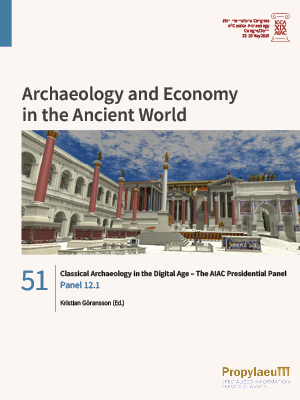Fröhlich, Thomas
The Economy of Death: New Research on Collective Burial Spaces in Rome from the Late Republic to the Late Roman Time: Panel 7.2
The contributions of this volume study economic aspects of Roman burial architectures for extended numbers of burials, such as columbaria, large hypogea, or catacombs, and try to form a picture of their owners and users. They discuss how far economic reasons played a leading role in the invention, the development and the use of these big burial monuments in Rome and how these buildings fulfilled the religious and social needs of their users, especially in the transitional period from the Roman to the Early Christian period. New studies in Roman funeral monuments could document interesting evidence for the dynamic process of the preparation and use of burial space. Especially in larger architectures for much more than a single family, the economic aspects of the ownership and use of these installations is fascinating. Who were the planners of the projects, why were certain places and specific architectures chosen? How and at what time in the project were the burials of the owners and their families provided for? In what manner were further tombs sold or given to others? And which locations within the installation were they able to get? During the last decades, a series of general studies on Roman burials and burial customs were base on older documentation out of necessity, while new and more detailed analysis of single monuments often provide new and different insights of interpretation."
Classical Archaeology in the Digital Age – The AIAC Presidential Panel: Panel 12.1
Classical Archaeology is a discipline which has undergone major changes in recent decades. From its origin as an “Altertumswissenschaft” with a strong emphasis on art and architecture, Classical Archaeology has embraced the most modern methods in field archaeology and analysis of data. The application of digital humanities to Classical Archaeology has changed how archaeologists work, how data is collected and preserved, and how results are made available to the scholarly community and the public in general. The International Association for Classical Archaeology (AIAC) has been a forerunner in digital humanities with the creation and running of Fasti Online and the online peer-reviewed journal FOLD&R. This volume contains papers presented at the panel organized by AIAC in order to present the digital development of the discipline through examples from different countries. It is hoped that the case studies will provide a basis for a discussion on Classical Archaeology in a digital world – benefits, challenges and where the fast development may take our discipline in the future.








